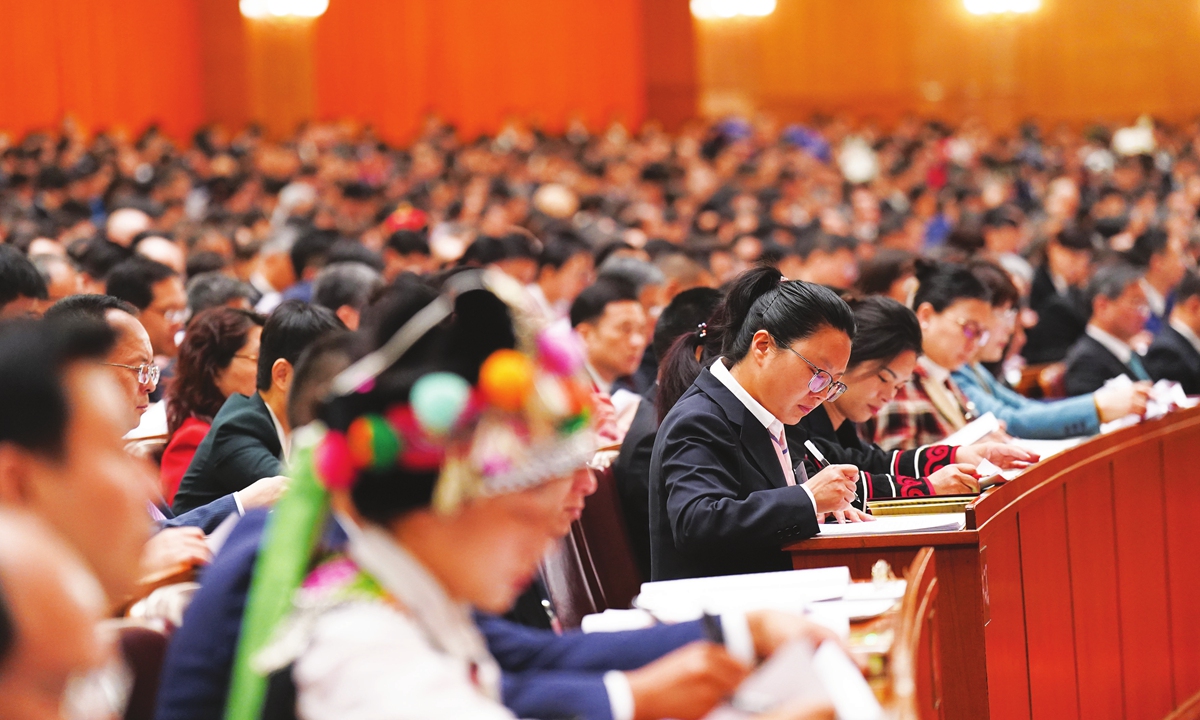China’s two sessions clear reflection of system designed to achieve consultation, cooperation and consensus

The second plenary meeting of the second session of the 14th NPC is held in Beijing on March 8, 2024. Photo: VCG
Editor's Note:
The two sessions in spring is vital to defining China's approach to economic, political and foreign policy issues for the whole year. It also offers observers a window into the latest ideas and practices of China's development in various aspects, including the whole-process people's democracy, high-quality development, Chinese modernization and the wisdom the country provides to global governance.
In the seventh piece of the series "Two sessions inspirations," David Ferguson (Ferguson), chief English editor at Foreign Languages Press and winner of the Chinese Government Friendship Award, shared his insights with the Global Times (GT) on the connotations of China's whole-process people's democracy and the difference between China's style of democracy and Western democracy.
GT: How do you understand China's system of whole-process people's democracy? How do the two sessions reflect China's system of whole-process people's democracy?
Ferguson: When I talk about China's democratic system, I always emphasize that it is based on a few principles. It's based on three Cs - consultation, cooperation and consensus.
The two sessions are a prime example of this. On one hand, in China, the people's congresses at all levels, including the National People's Congress (NPC), are constituted through democratic elections.
On the other hand, China has the Chinese People's Political Consultative Conference (CPPCC), which serves as a consultative body representing a broad swath of Chinese society. It includes representatives from the Communist Party of China (CPC) and other democratic parties, various social and professional bodies, as well as special administrative zones and overseas Chinese. It reflects the broadest possible representation of the Chinese society.
The two sessions are a clear reflection of a system designed to achieve consultation, cooperation and consensus. China's society is striving toward the same goals, participating in defining and implementing these goals.
GT: What are some misunderstandings that the West has about China's system of whole-process people's democracy? Why do you think these misunderstandings are difficult to dispel?
Ferguson: The anti-China sentiment in the West is not merely a misunderstanding; it is a deliberately cultivated hostility and prejudice that operates on an emotional level. They are talking to people who know nothing about a country and painting that country in the most negative light possible. They create hostility and prejudice uninformedly. To address this issue, China cannot treat it as a purely rational problem; instead, it must confront it on the same emotional level on which it was created.
Engaging with a hostile audience and dealing with confrontation and conflict is not natural within Chinese culture. Therefore, China must explore more creative approaches to counter this sentiment, such as telling China's stories. President Xi Jinping has repeatedly emphasized the importance of telling China's stories, as stories resonate on an emotional level.
China needs to find better ways to address this issue because the West is already anticipating and responding to China's reactions. For example, when countries like the US attempt to ban TikTok, it's because they understand that TikTok effectively engages with a young audience on an emotional level and serves as a platform for telling positive Chinese stories to young people who have not yet internalized the hostility that the West is trying to cultivate.
GT: In your opinion, what is the biggest difference between China's style of democracy and Western democracy?
Ferguson: The biggest single difference is that in China, it can be absolutely certain that the people who govern, the President, the State Council, the CPC Central Committee, NPC, and CPPCC, are people one can see. They articulate their plans in great detail and then proceed to execute them.
In contrast, in the West, it's the opposite. If you can see them, they are not running the show. No intelligent person could believe that President Biden is actually in charge of what is happening in the US. Any intelligent person pretending to believe so is a liar. Furthermore, Western politicians often promise things during their campaigns that they don't do. When they have the power, they do the opposite or something very different from what they claimed they would do. This is the fundamental difference between the two systems summed up very simply.
GT: What are the main problems with US democracy, and what impact has this had on the world today?
Ferguson: The main problem with the US system, and Western democratic politics in general, is that they operate in the opposite manner of the Chinese system I just described as three Cs. Western systems are also based on three Cs, but very differently - competition, confrontation and conflict.
The voting and election process puts people in competition with each other, this is particularly evident in the US primaries where candidates compete for the position to stand for president. This competition often leads to confrontation, as individuals argue and have disputes. Such confrontation ultimately results in conflict, both within and between parties. While most people prefer not to engage in conflict, there are those who enjoy it - often individuals who are dysfunctional and bullies, war-mongering, greedy for power and money, self-centered, or narcissistic, lacking empathy for others.
In the Western democratic system, this setup tends to nurture and elevate individuals who are generally unpleasant and dysfunctional, allowing them to rise to positions of power. Many educated Americans express frustration with this phenomenon, wondering how it is possible that in a country of 330 million people, they are [most likely] left with a binary choice for leader between Donald Trump and Joe Biden in 2024, whose professional conducts both leave a lot to be desired. This is a feature of the system, as it is designed to favor such individuals, while ordinary, decent people tend to avoid or abandon involvement in such processes.
GT: You have previously stated that US democracy is actually a scam. In what ways do you think it is a scam?
Ferguson: In the West, there is a phenomenon called the professionalization of politics. Professionalization is normally a good thing. It means making something more professional and more competent. The professionalization of politics is the opposite because it means you're turning politics into a career. The type of people who are now attracted to politics in Western democratic systems are not people who want to serve the public wholeheartedly; they are in it for themselves.
And in the US, in particular, the amount of money that it attracts leads to a grotesque level of corruption. The American democratic process is all about getting yourself elected so that you can start to collect money so that you can get yourself elected next time around as well. American presidents and presidential candidates devote most of their effort and time to raising money for the next election, and the interests of the public and the interests of the country become a very distant thing on the list of Western political priorities.
The most important person for senior Western politicians to hire is the spin doctor. It's not an accident because the most important thing from the perspective of a Western senior politician is managing tomorrow's headlines, managing next week's headlines; they barely ever look forward for more than a week. So, their key staff person is the spin doctor, the guy who is responsible for managing the media image. None of that contributes to good governance.
GT: Why do Western countries, such as the US, focus more on attacking China's style of democracy rather than addressing their own institutional flaws?
Ferguson: I mentioned the situation in terms of the US election, but again, this is something that applies generally to Western politics. The internal political discourse is utterly polarized and poisonous. For instance, the current debate between Democrats and Republicans in the US is characterized by hatred, and that is not too strong a word for it. The party system encourages this polarization, division, conflict, and hatred. What you have in the US, in terms of internal political discourse, is like two tribes of starving wolves, savaging each other's entrails in the bowels of a post-apocalyptic dystopia.
Now, there has to be a safety valve to prevent US society from completely breaking down and descending into binary and violent social conflict. The only safety valve available is an external target. So systematically, while they encourage this internal, polarized, poisonous debate, they also always point to somebody else outside of the US as the enemy that they must unite against. That is why in the US, they spend so much time focused on other people, pointing out their shortcomings, and turning them into the enemy. It's an essential safety valve to release the internal pressure caused by the system.
GT: How would you define a successful democratic model? What significance does China's system of whole-process people's democracy have on the global development of democracy?
Ferguson: The West continually projects the idea that to achieve success and prosperity, a country must adopt democracy in the Western model - voting in elections and choosing its leaders. However, none of the developed Western countries followed this process. They became prosperous and successful long before they embraced democracy by brutally exploiting their own working classes and other countries through colonialism or occupation. When states like Ukraine, Iraq, and Libya adopt or are forced to adopt Western democracy, the consequences are often negative.
In my opinion, there are two obvious signs of China's political model that do work for other countries. First of all, keeping direct elections on a human level, keeping them local. Once you've elected representatives that you can trust and that do a good job, allow them the authority to choose the next level. They are looking at their colleagues and peers, identifying people with aptitude, capability and achievements, and choosing the best people for the next level.
The second aspect that can be adopted is to focus on cooperation, consultation, and consensus to create bodies that are representative of society. The CPPCC could be compared in many ways to the House of Lords in the UK. However, the House of Lords is not representative of society; it doesn't represent youth, professional bodies, or social bodies. So, if you're going to have a consultative body or a non-elected body, then ensure that you spread the membership as widely as possible and choose people with a genuine history of achievement.
These are the two elements of China's system that can be partially adopted by other countries and will work. If you do that, then you will have people who genuinely want to work for the interests of the country, the public and the people.


